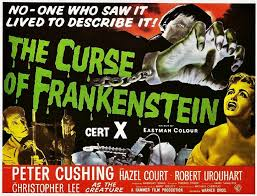I don’t get paid for writing about films, so why do I do it so much? The same reason I do anything else, I suppose: it seems worthwhile in some way or other. Another question which I get asked less often is why I’m so interested in films which are so old and (from a certain point of view) clunky that many people nowadays find them impossible to engage with.
Well – I don’t see the logic in saying that a film is bad just because it’s old; by that reasoning every film ever made is slowly deteriorating in quality all the time. But I do think that old movies offer us a useful perspective on the world at the time in which they were made, especially genre movies, which I generally find a lot more honest.
All of which is preamble to a look at the 1957 version of The Curse of Frankenstein, directed by Terence Fisher – yes, a bit of a mini-Hammer horror season of late. This particular movie comes loaded with significance – Hammer’s first Gothic horror movie, Christopher Lee’s first really striking lead role, the first colour version of this particular story, Lee’s first on-screen pairing with Peter Cushing…
Cushing, of course, plays Baron Frankenstein himself. The film has an interesting framing device where a priest turns up at the cell where Frankenstein is being held prior to being guillotined for his terrible crimes – not because the Baron is seeking to repent, but because he wants someone to hear how none of it was really his fault…
Well, that’s a marginal claim at best, as we see. The film flashes back to Frankenstein as a youth (played by Melvyn Hayes from It Ain’t Half Hot Mum, slightly startlingly), coming into his fortune and hiring his own tutor, Krempe (Robert Urquhart). Frankenstein’s brilliant intellect develops apace, and the investigations of the two men turn, almost inevitably, from conventional medical research to a somewhat darker avenue…
And it’s here, to be honest, that we start to see one of the things that marks Curse out as a product of its time. I was a bit indifferent about the Ken Branagh version of Frankenstein last year, but one thing which that telling does do well is to give Frankenstein some kind of motivation for his researches – why is this man so obsessively fascinated with and compelled to explore the secrets of life and death? Branagh answers this question; Fisher doesn’t. This film is more melodrama than drama, in which the plot dictates the characters’ actions rather than vice versa.
So Frankenstein starts assembling his infamous creation on rather dubious pretexts – mainly because the story demands it, as I said. Krempe is unimpressed and eventually refuses to participate, on the grounds that this experiment is obviously obscene. Perhaps it’s another example of cultural standards changing, or possibly it’s just me, but I wouldn’t say that reanimating a corpse is a ghastly crime against nature, per se – don’t we have defibrillators for just that purpose? Yet the film expects us to share Krempe’s opinion, I think.
The need to ensure this may be why Frankenstein himself, who is initially presented as someone unorthodox and slightly fixated but not actually evil, rapidly and not necessarily plausibly turns into a complete fiend. Needing a brain for his creature, he murders a kindly old professor who is visiting his home (sadly the brain gets damaged in a scuffle with Krempe) – and if that wasn’t enough, it is later revealed he has been up to some seigneurial whoa-ho-ho with the maid (Valerie Gaunt), whom he eventually has to dispose of using the Creature.
It’s a bit of a cliche to say this, but the fundamental difference between the Hammer cycle of Frankenstein movies and the Universal series is in their focus – the main character for Hammer is the Baron, while the Universal films are more about the Creature. This is certainly true here, as Christopher Lee doesn’t get much to do until quite late on (in a famous anecdote, he complained to Cushing about not getting any lines – ‘Count yourself lucky, I’ve read the script’ was Cushing’s reply), and he’s certainly more sinned against than sinning. Cushing’s Frankenstein, on the other hand, is definitely a bad guy.
So my memory has been cheating me, it seems – writing about the much later Frankenstein and the Monster from Hell, I observed that Cushing’s Frankenstein was ‘rarely definitively evil’ – well, he certainly is here, originating the character. Possibly I’m letting Cushing’s usual screen persona of decent integrity confuse me, or the actor himself is quietly striving throughout to create a plausible characterisation in parallel with the requirements of the plot.
It all concludes with the usual mayhem, and along the way there are various examples of gleeful nastiness that horrified film critics at the time: severed body parts, acid baths, and a veritable fountain of Kensington Gore when Krempe puts a bullet in the Creature’s head (‘the shot heard round the world’ of horror films, as Mark Gatiss memorably put it a few years ago). This is a film of various creative tensions – first rate actors trying their best with melodramatic schlock, quality costume-drama trappings being laid about a gory B-movie – and perhaps it’s here that the essential magic of the Hammer films is to be found.
Every time I’ve written about one of the ‘first generation’ Hammer horrors in the past – mainly Dracula and The Mummy – I’ve commented, usually negatively, about how polite and well-mannered they were. That’s much less the case with The Curse of Frankenstein – there’s a rich vein of mischievious nastiness going on that still makes it stand out as something unusual, and special: the real origin of the Hammer horror brand, and an enjoyably over-the-top film even today.
